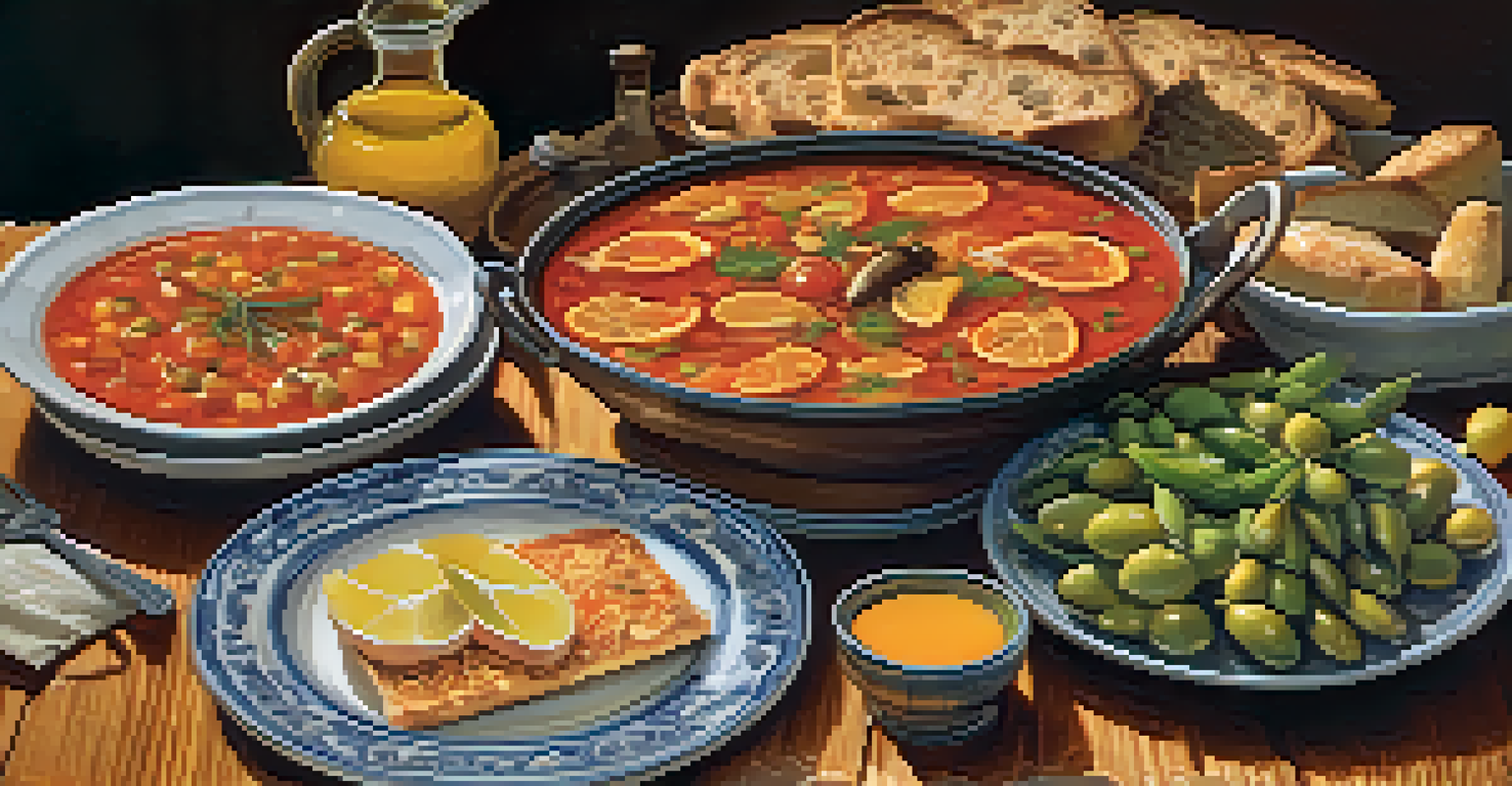The Role of Olive Oil in Spain: A Culinary Exploration

A Brief History of Olive Oil in Spain
Olive oil has been an integral part of Spanish culture for thousands of years, dating back to ancient civilizations. The Phoenicians and Greeks were among the first to cultivate olives, establishing the foundation for Spain's deep-rooted relationship with this golden elixir. Today, Spain is the world's largest producer of olive oil, contributing significantly to its culinary identity.
Olive oil is the liquid gold of the Mediterranean, a staple that nourishes both body and soul.
The unique climate and geography of Spain, particularly in regions like Andalusia, create the perfect conditions for olive groves. With over 260 varieties of olives grown, each region boasts distinct flavors and characteristics, enhancing the nation’s diverse culinary landscape. This rich heritage is reflected in local dishes that celebrate the versatility of olive oil.
As we delve into the role of olive oil in Spanish cuisine, it’s essential to appreciate its historical significance. From ancient rituals to modern-day kitchens, olive oil is a symbol of tradition, quality, and sustainability in Spain, making it a beloved staple for both locals and visitors alike.
Olive Oil Varieties and Their Unique Flavors
Spain is home to a wide array of olive oil varieties, each offering a unique flavor profile. From the robust and peppery Picual to the mild and fruity Arbequina, these different types cater to various culinary needs and preferences. Understanding these nuances can elevate any dish, making the selection of olive oil just as important as choosing the right wine.

For instance, a bold Picual oil pairs beautifully with hearty dishes like grilled meats, while a delicate Arbequina oil enhances lighter fare such as salads and seafood. This versatility allows chefs and home cooks to explore a world of flavors by simply changing their choice of olive oil. It’s like having a secret ingredient that can transform a meal.
Olive Oil's Rich Cultural Heritage
Olive oil has been a staple in Spanish culture for thousands of years, deeply intertwined with its culinary identity and traditions.
When selecting olive oil, look for the 'extra virgin' label, which signifies the highest quality and purity. By experimenting with different varieties, you can discover how each one complements your favorite recipes, adding depth and richness to your culinary creations.
The Health Benefits of Olive Oil
Beyond its culinary uses, olive oil is celebrated for its numerous health benefits. Rich in monounsaturated fats and antioxidants, it has been linked to improved heart health, reduced inflammation, and even enhanced brain function. Incorporating olive oil into your diet can contribute to a healthier lifestyle while adding delicious flavor to your meals.
Cooking is like love. It should be entered into with abandon or not at all.
The Mediterranean diet, which highlights the use of olive oil, has garnered attention for its role in promoting longevity and overall well-being. Studies suggest that regions with high olive oil consumption, such as Spain, often exhibit lower rates of chronic diseases. This connection between diet and health underscores the importance of quality ingredients.
When embracing olive oil as part of your cooking, consider the health benefits it brings. Whether you’re drizzling it over roasted vegetables or using it as a base for dressings, you’ll be nourishing your body while enjoying the rich flavors that olive oil offers.
Olive Oil in Traditional Spanish Dishes
Olive oil is a key player in many traditional Spanish dishes, showcasing its versatility and importance in the culinary world. From the iconic gazpacho to the beloved paella, olive oil is often a foundational ingredient that enhances flavors and textures. Each dish tells a story, reflecting regional ingredients and cooking techniques that have been passed down through generations.
In tapas culture, olive oil shines in simple yet flavorful dishes like pan con tomate, where crusty bread is drizzled with high-quality olive oil and ripe tomatoes. This highlights how just a few ingredients can come together to create something extraordinary, thanks to the richness of olive oil. It’s a perfect example of the Spanish philosophy of celebrating quality over quantity.
Diverse Varieties Enhance Dishes
Spain's wide array of olive oil varieties provides unique flavor profiles that can elevate any dish, making oil selection essential in cooking.
Exploring traditional Spanish cuisine without olive oil feels incomplete, as it embodies the essence of Spanish cooking. Each dish not only nourishes the body but also connects us to the cultural heritage and communal spirit that olive oil represents in Spain.
Cooking Techniques That Highlight Olive Oil
The cooking techniques used in Spanish cuisine often emphasize the use of olive oil, showcasing its ability to elevate flavors. From frying to sautéing, olive oil is a go-to choice for many chefs, thanks to its high smoke point and rich taste. Whether you’re preparing a classic tortilla española or a simple vegetable sauté, olive oil plays a crucial role in the cooking process.
One popular technique is 'sofrito,' a flavor base made by gently cooking garlic, onions, and tomatoes in olive oil. This method not only enhances the dish's flavor but also showcases the oil’s ability to infuse ingredients with a rich, aromatic quality. It’s a fundamental technique that reflects the heart of Spanish cooking.
By incorporating olive oil into various cooking methods, you can unlock an array of flavors and textures. Experimenting with these techniques will deepen your appreciation for the role of olive oil in Spanish cuisine and inspire you to create your own culinary masterpieces at home.
Pairing Olive Oil with Wine: A Spanish Tradition
In Spain, the art of pairing olive oil with wine is a cherished tradition that enhances the dining experience. Just as certain wines complement specific dishes, the right olive oil can elevate the flavors of various wines, creating a harmonious balance on the palate. This pairing is a celebration of Spain’s rich agricultural heritage and culinary creativity.
For example, a robust red wine from Rioja pairs beautifully with a strong Picual olive oil, while a crisp white wine from Rueda complements lighter, fruity oils like Arbequina. This practice encourages exploration and experimentation, allowing diners to discover delightful combinations that enhance their meals.
Health Benefits of Olive Oil
Incorporating olive oil into your diet can improve heart health and overall well-being, highlighting its importance in the Mediterranean diet.
Understanding the nuances of olive oil and wine pairing can transform a simple meal into a memorable culinary adventure. By paying attention to flavors and textures, you can create a dining experience that pays homage to Spain’s vibrant food culture.
Sustainable Practices in Olive Oil Production
As the demand for olive oil continues to grow, sustainable practices in its production have become increasingly important. Many Spanish olive oil producers are committed to environmentally friendly methods, focusing on organic farming and responsible harvesting techniques. This approach not only supports the ecosystem but also enhances the quality of the oil itself.
Sustainable olive oil production often involves maintaining biodiversity within olive groves, using natural pest control methods, and reducing water consumption. These practices not only benefit the environment but also contribute to the rich flavors and nutritional benefits of the oil. By choosing sustainably produced olive oil, consumers can support ethical farming practices.

Exploring the world of olive oil offers an opportunity to appreciate the hard work and dedication of those who produce it. By selecting high-quality, sustainably sourced olive oil, you can enjoy its myriad benefits while contributing to the preservation of both the land and the culinary traditions of Spain.